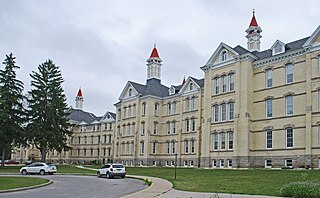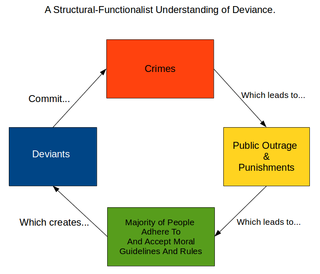Related Research Articles
The insanity defense, also known as the mental disorder defense, is an affirmative defense by excuse in a criminal case, arguing that the defendant is not responsible for their actions due to an episodic psychiatric disease at the time of the criminal act. This is contrasted with an excuse of provocation, in which the defendant is responsible, but the responsibility is lessened due to a temporary mental state. It is also contrasted with a finding that a defendant cannot stand trial in a criminal case because a mental disease prevents them from effectively assisting counsel, from a civil finding in trusts and estates where a will is nullified because it was made when a mental disorder prevented a testator from recognizing the natural objects of their bounty, and from involuntary civil commitment to a mental institution, when anyone is found to be gravely disabled or to be a danger to themself or to others.
Involuntary commitment, civil commitment, or involuntary hospitalization/hospitalisation is a legal process through which an individual who is deemed by a qualified agent to have symptoms of severe mental disorder is detained in a psychiatric hospital (inpatient) where they can be treated involuntarily. This treatment may involve the administration of psychoactive drugs, including involuntary administration. In many jurisdictions, people diagnosed with mental health disorders can also be forced to undergo treatment while in the community; this is sometimes referred to as outpatient commitment and shares legal processes with commitment.
Outpatient commitment—also called assisted outpatient treatment (AOT) or community treatment orders (CTO)—refers to a civil court procedure wherein a legal process orders an individual diagnosed with a severe mental disorder to adhere to an outpatient treatment plan designed to prevent further deterioration or recurrence that is harmful to themselves or others.

Psychiatric hospitals, also known as mental health hospitals,behavioral health hospitals, are hospitals or wards specializing in the treatment of severe mental disorders, such as schizophrenia, bipolar disorder, eating disorders, dissociative identity disorder, major depressive disorder and many others. Psychiatric hospitals vary widely in their size and grading. Some hospitals may specialize only in short-term or outpatient therapy for low-risk patients. Others may specialize in the temporary or permanent containment of patients who need routine assistance, treatment, or a specialized and controlled environment due to a psychiatric disorder. Patients often choose voluntary commitment, but those whom psychiatrists believe to pose significant danger to themselves or others may be subject to involuntary commitment and involuntary treatment. Psychiatric hospitals may also be called psychiatric wards/units when they are a subunit of a regular hospital.

Broadmoor Hospital is a high-security psychiatric hospital in Crowthorne, Berkshire, England. It is the oldest of the three high-security psychiatric hospitals in England, the other two being Ashworth Hospital near Liverpool and Rampton Secure Hospital in Nottinghamshire. The hospital's catchment area consists of four National Health Service regions: London, Eastern, South East and South West. It is managed by the West London NHS Trust.

Forensic psychiatry is a subspeciality of psychiatry and is related to criminology. It encompasses the interface between law and psychiatry. According to the American Academy of Psychiatry and the Law, it is defined as "a subspecialty of psychiatry in which scientific and clinical expertise is applied in legal contexts involving civil, criminal, correctional, regulatory, or legislative matters, and in specialized clinical consultations in areas such as risk assessment or employment." A forensic psychiatrist provides services – such as determination of competency to stand trial – to a court of law to facilitate the adjudicative process and provide treatment, such as medications and psychotherapy, to criminals.

Rampton Secure Hospital is a high-security psychiatric hospital near the village of Woodbeck between Retford and Rampton in Nottinghamshire, England. It is one of three high-security psychiatric hospitals in England, alongside Ashworth Hospital in Merseyside and Broadmoor Hospital in Berkshire. It is managed by Nottinghamshire Healthcare NHS Foundation Trust.
The Lanterman–Petris–Short (LPS) Act regulates involuntary civil commitment to a mental health institution in the state of California. The act set the precedent for modern mental health commitment procedures in the United States. The bipartisan bill was co-authored by California State Assemblyman Frank D. Lanterman (R) and California State Senators Nicholas C. Petris (D) and Alan Short (D), and signed into law in 1967 by Governor Ronald Reagan. The Act went into full effect on July 1, 1972. It cited seven articles of intent:

Bryce Hospital opened in 1861 in Tuscaloosa, Alabama, United States. It is Alabama's oldest and largest inpatient psychiatric facility. First known as the Alabama State Hospital for the Insane and later as the Alabama Insane Hospital, the building is considered an architectural model. The hospital currently houses 268 beds for acute care, treatment and rehabilitation of full-time (committed) patients. The Mary Starke Harper Geriatric Psychiatry Hospital, a separate facility on the same campus, provides an additional 100 beds for inpatient geriatric care. The main facility was added to the National Register of Historic Places in 1977.

The Mental Health Act 1983 (c.20) is an Act of the Parliament of the United Kingdom. It covers the reception, care and treatment of mentally disordered people, the management of their property and other related matters, forming part of the mental health law for the people in England and Wales. In particular, it provides the legislation by which people diagnosed with a mental disorder can be detained in a hospital or police custody and have their disorder assessed or treated against their wishes, informally known as "sectioning". Its use is reviewed and regulated by the Care Quality Commission. The Act was significantly amended by the Mental Health Act 2007. A white paper proposing changes to the act was published in 2021 following an independent review of the act by Simon Wessely.
In England, the First-tier Tribunal , more commonly known as the Mental Health Tribunal, is an independent quasi-judicial body established to safeguard the rights of persons subject to the Mental Health Act 1983. It provides for consideration of appeals against the medical detention or forced treatment of a person who was deemed to be suffering from a mental disorder that was associated with a risk to the health or safety of that person or others.
Involuntary treatment refers to medical treatment undertaken without the consent of the person being treated. Involuntary treatment is permitted by law in some countries when overseen by the judiciary through court orders; other countries defer directly to the medical opinions of doctors.
Electroconvulsive therapy is a controversial psychiatric treatment in which seizures are induced with electricity. ECT was first used in the United Kingdom in 1939 and, although its use has been declining for several decades, it was still given to about 11,000 people a year in the early 2000s.
Virginia Gonzalez Torres is a female human rights activist in Mexico who provides support and resources for the mentally ill. She is often referred to as the Dorothea Dix of Mexico.

The Mental Health Act 2007 is an Act of the Parliament of the United Kingdom. It amended the Mental Health Act 1983 and the Mental Capacity Act 2005. It applies to people residing in England and Wales. Most of the Act was implemented on 3 November 2008.

Eastern State Hospital is a psychiatric hospital established in 1891 in Medical Lake, a small community 20 miles (32 km) southwest of Spokane, Washington. The original building was a Kirkbride Plan and the current building has a similar floor plan with male and female wings extending out from the main building.
Political abuse of psychiatry, also commonly referred to as punitive psychiatry, is the misuse of psychiatry, including diagnosis, detention, and treatment, for the purposes of obstructing the human rights of individuals and/or groups in a society. In other words, abuse of psychiatry is the deliberate action of having citizens psychiatrically diagnosed who need neither psychiatric restraint nor psychiatric treatment. Psychiatrists have been involved in human rights abuses in states across the world when the definitions of mental disease were expanded to include political disobedience. As scholars have long argued, governmental and medical institutions code menaces to authority as mental diseases during political disturbances. Nowadays, in many countries, political prisoners are sometimes confined and abused in psychiatric hospitals.
A mental health tribunal is a specialist tribunal (hearing) empowered by law to adjudicate disputes about mental health treatment and detention, primarily by conducting independent reviews of patients diagnosed with mental disorders who are detained in psychiatric hospitals, or under outpatient commitment, and who may be subject to involuntary treatment.
Involuntary commitment or civil commitment is a legal process through which an individual with symptoms of severe mental illness is court-ordered into treatment in a hospital (inpatient) or in the community (outpatient).
The Scottish Union of Mental Patients was an organisation first established by mental patients at Hartwood Hospital in July 1971. 27 patients signed a petition to "redress of grievances and better conditions" at the hospital. This was the first Mental Patients Union to be formed in the UK and predated the Mental Patients' Union founded in London in 1973. It was founded by ,Thomas Ritchie, and Robin Farquharson was also a participant. Unlike many other examples of anti-psychiatry SUMP was based on a sense of solidarity amongst a small group of patients detained in locked wards.
References
- ↑ McKenna, Yvonne (October 1999). "The Ruddle case: the lawyer's view". Journal of the Law Society of Scotland. Retrieved 27 April 2022.
- ↑ Gallaher, Mark (2017). From Mental Patient to Service User: Deinstitutionalisation and the Emergence of the Mental Health Service User Movement in Scotland 1971-2006 (PDF) (PhD). University of Glasgow. Retrieved 27 April 2022.